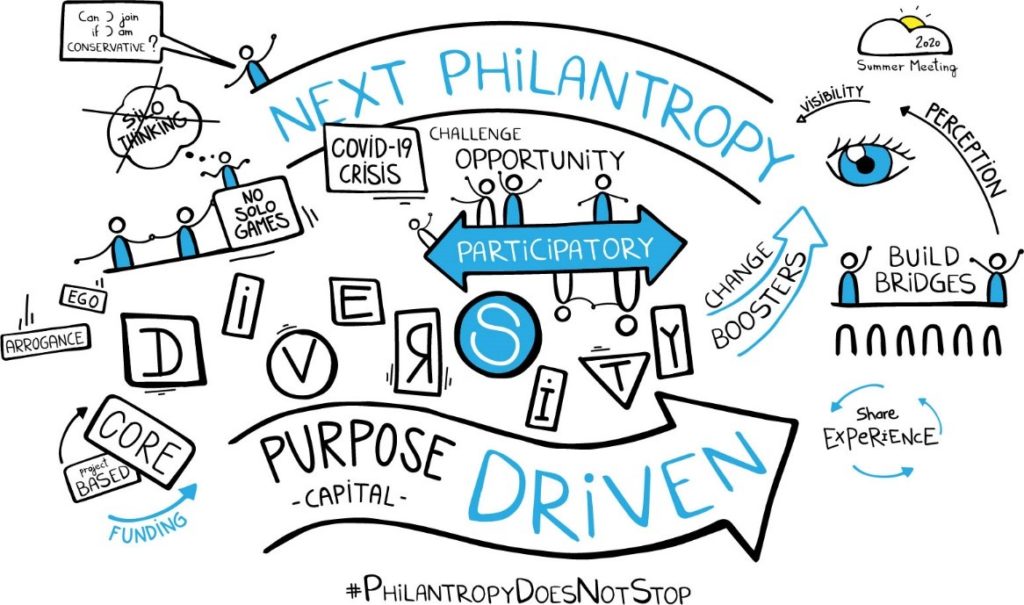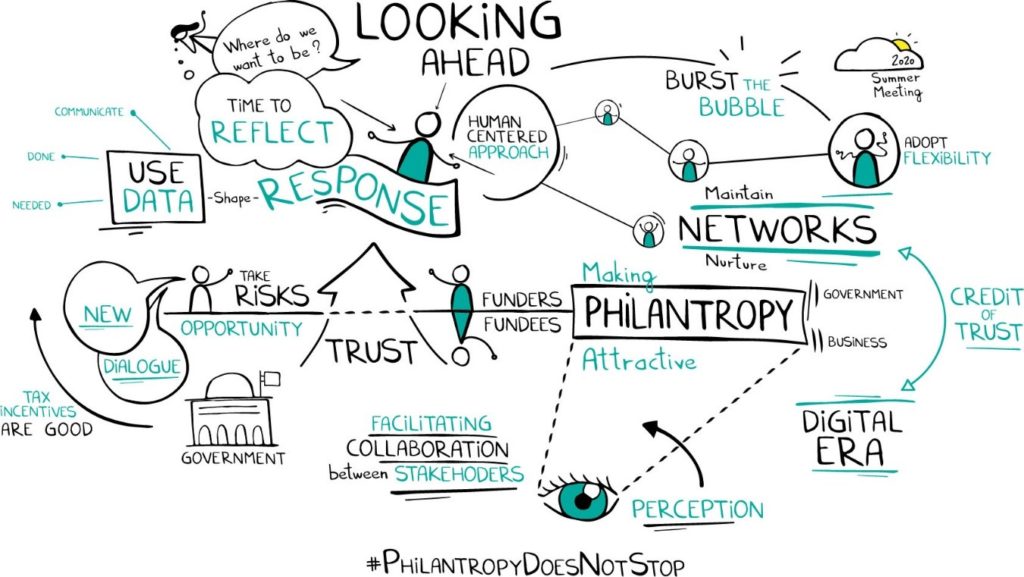DAFNE Summer Meeting 2020 Digest
#PhilanthropyDoesNotStop
DAFNE held its annual Summer Meeting on 19 May 2020. This year, the Covid-19 pandemic shaped not only the theme of this year’s meeting – #PhilanthropyDoesNotStop being the hashtag we have used to communicate philanthropy’s work around the crisis – but also the format and means of participation in the meeting. Instead of meeting in Vienna as had originally been planned, the meeting was held online via zoom, which DAFNE used as an opportunity to extend the invitation to all colleagues within member organisations.
Thematic discussions: Climate Commitment, Gender & NextPhilanthropy
The Climate Commitment session was led by Carol Mack (ACF/UK) with experiences shared by Raffaella Toticchi (AEF/ES) and Jean-Marc Pautras (CFF/F). Presentations on how the three national associations have been developing tools and supporting their members with resources were followed by wider discussions. These revealed an interest in principle to start connecting more focused climate initiatives with existing discussions around SDGs.
The discussion in the session on Gender, led by Anke Pätsch from the Association of German Foundations, focused on the need for wider and more thorough research and data collection, as well as reflections on the need for age diversity. Both sessions were followed by a group Q&A session which created space for more individual exchange and case-specific suggestions.
In thinking through what Next Philanthropy should look like, participants agreed it must be participatory, democratic, collaborative, inclusive, engaging, local and diverse. All these descriptive words imagine a philanthropic future that creates space and magnifies different voices, while building trust between different partners and actors. It was highlighted that that Next Philanthropy should also be digital, data focused, and evidence based, speaking to a need to learn, innovate and upskill the sector.

Shifting towards what participants imagine Next Philanthropy to be requires certain aspects of present-day philanthropy to be left behind. Members echoed one another in stressing that philanthropy must become less elitist and opaque, while existing silos and bubbles must be replaced with more sharing and cooperation. They envisioned Next Philanthropy as purpose-driven rather than capital-driven. Looking forward, uncertainty about the presents both challenges and opportunities, while conversations around Next Philanthropy are ongoing and ever evolving.
Peer exchange
The next session invited participants into separate breakout rooms to meet their peers: advocacy experts, Board members, National Association CEOs, communication experts, colleagues working on membership and engagement, and researchers. In each peer group, participants were encouraged to share best practices, recent learnings, and favourite failures.
Looking forward: reflecting on the learnings from Covid-19
Following a surprise 15-minute online yoga session to give participants some new energy, the last session circled back to its origins by explicitly addressing the Covid-19 crisis and its learnings. Assifero’s Carola Carrazzone introduced the session by stressing that the present moment is not only a health crisis, but also a social, economic, and political crisis. With foundations responding to the crises, Carola encouraged participants to assess where the role of associations lies within this response.
The Covid-19 crisis had revealed that foundations are more flexible and responsive than the government, which has been a realisation of the sector’s ability to act quickly, as well as helping philanthropy better communicate its role to the public and to government. Members referred to the lack of control as a ‘new normal’, and the Covid experience was also understood as an urgent lesson in risk-taking and crisis management.

Going forward, DAFNE members saw these learnings as highlighting important potential shifts in their associations’ operations. Many cited digitalisation, better digital training, increased use of new tools and technology, with some discussion of #techforgood. Participants also stressed the need for increased data collection for better evidence-based decision making. There was consensus around trying to maintain the current dynamic of flexibility, greater leadership and a stronger public voice post-crisis. This was paired with a general feeling that the collaborations, partnerships and connections we are seeing emerge in this moment of crisis must continue, both within philanthropy and with stakeholders beyond the sector.
